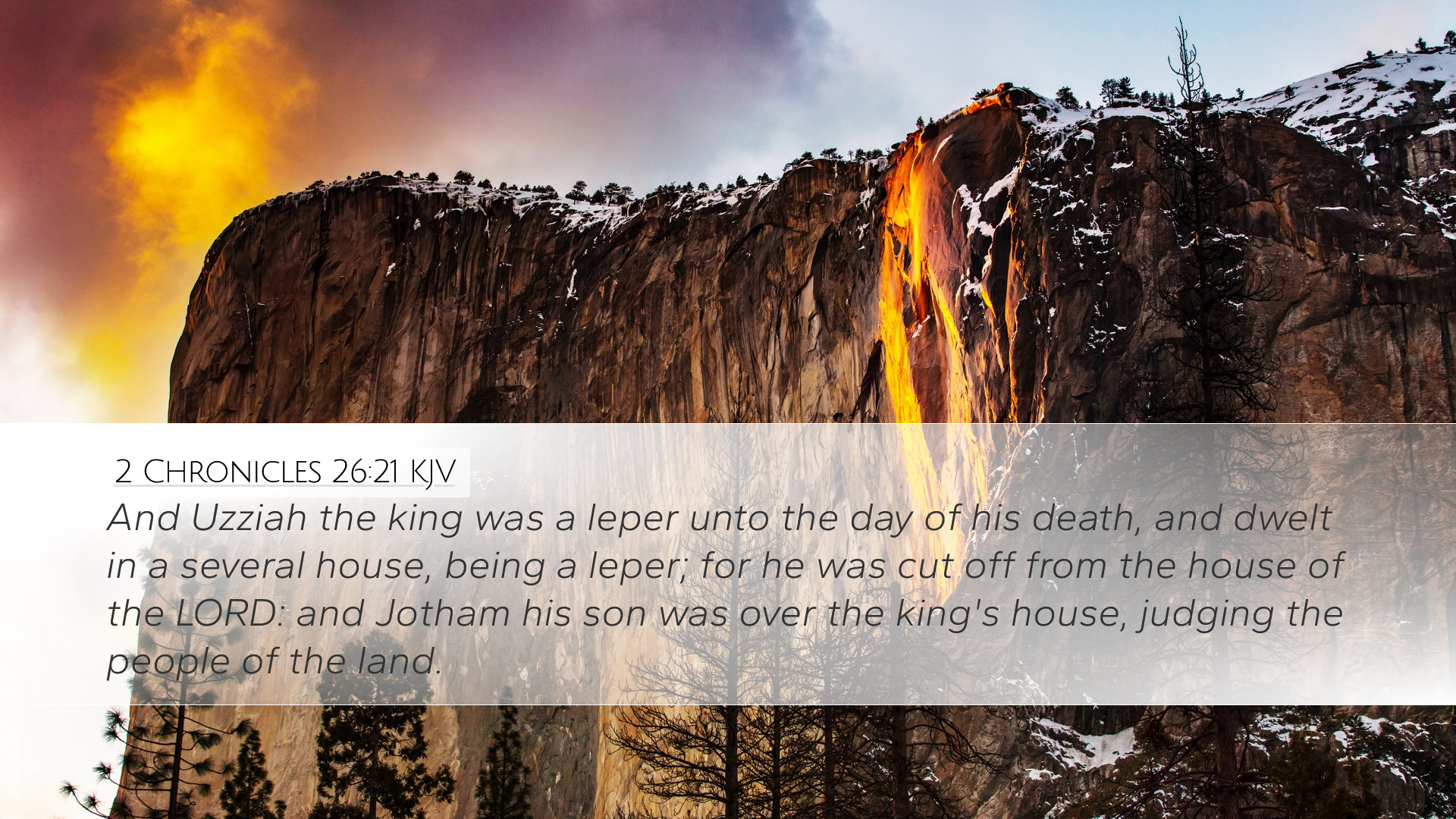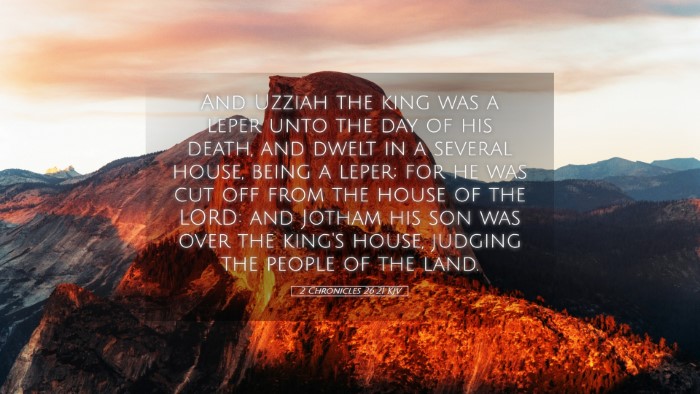Commentary on 2 Chronicles 26:21
“And Uzziah the king was a leper unto the day of his death, and dwelt in a several house, being a leper; for he was cut off from the house of the Lord: and Jotham his son was over the king's house, judging the people of the land.”
Introduction
This verse encapsulates a profound and tragic reality in the life of King Uzziah, highlighting themes of sin, consequence, and the importance of humility before God. It serves as a poignant reminder for pastors, scholars, and students of scripture on the nature of leadership, the reality of divine judgment, and the necessity of remaining in communion with God. In delving into the commentaries of Matthew Henry, Albert Barnes, and Adam Clarke, we can unravel the rich layers of meaning contained in this text.
Historical Context
Uzziah, also known as Azariah, was a king of Judah whose reign was initially marked by prosperity and military success (2 Chronicles 26:1-15). However, the account in 2 Chronicles ultimately presents a turning point when Uzziah's pride leads him to encroach upon the duties reserved for the priests, resulting in severe consequences (2 Chronicles 26:16-21).
Commentary Insights
Matthew Henry's Commentary
Henry reflects on the sobering reality of Uzziah's leprosy as both a physical ailment and a symbol of his separation from God. He emphasizes that Uzziah's leprosy served to illustrate the principle that sin brings separation from the holy. The king's pride and disobedience led to his isolation, not only from the people but also from the temple worship.
- Separation from God: Henry notes that Uzziah's leprosy was a divine judgment reflecting a spiritual reality—being cut off from the house of the Lord signifies the severity of his disobedience.
- Judgment and Humility: The commentary highlights Uzziah's fall from a position of power to one of humiliation, showcasing the importance of humility and the dangers of pride.
Albert Barnes' Commentary
Barnes provides additional context by explaining the role of leprosy in the Old Testament. He describes it as a disease that not only afflicted the body but also rendered individuals ceremonially unclean. Uzziah's leprosy serves as a reminder of God's holy standards and the life of purity expected of those in positions of authority.
- Ceremonial Impurity: Barnes elaborates that Uzziah's condition barred him from the temple, foreshadowing the broader implications of sin that lead to exclusion from God's presence.
- Governance by Jotham: He notes the intended continuity in governance through Jotham, Uzziah's son, suggesting that God, in His mercy, provided a means for continued leadership, albeit under a different paradigm.
Adam Clarke's Commentary
Clarke emphasizes the tragic irony in Uzziah's end, as his earlier successes were eclipsed by his later failures. His analysis reflects a deep understanding of leadership and character.
- The Danger of Success: Clarke warns that success can lead to pride, which is often the precursor to downfall, a theme evidenced in Uzziah's life.
- The Loneliness of Isolation: His reflection on Uzziah's dwelling in a separate house underlines the deep isolation that sin brings, a reminder to church leaders about the potential consequences of moral failure.
Theological Implications
Throughout history, leaders in spiritual and secular realms alike must grapple with the profound implications of humility, accountability, and the need for repentance. Uzziah's story serves as a cautionary tale.
- Leadership and Accountability: Those in positions of authority are held to a higher standard. Uzziah's story is a stark reminder that spiritual leaders must not only lead others but also maintain a humble heart before God.
- God's Sovereignty: The eventual judgment that Uzziah faced illustrates the sovereign authority of God. Even those who achieve great things can fall, reminding us of the ultimate power and righteousness of God's justice.
- The Nature of Divine Discipline: Just as Uzziah was cut off due to sin, it reflects God's desire for his people to return to holiness. This serves both as a warning and an encouragement for believers to seek God's favor anew.
Conclusion
2 Chronicles 26:21 encapsulates profound truths about the pitfalls of pride, the seriousness of sin, and the importance of remaining in fellowship with God. Through the insights of respected commentators, we learn that the life of Uzziah offers critical lessons about leadership, the need for humility, and the consequences of disobedience. For pastors, students, and scholars, this passage encourages a reflective posture as they seek to lead faithfully, recognizing that humility and dependence on God are vital to enduring success in any ministry.


